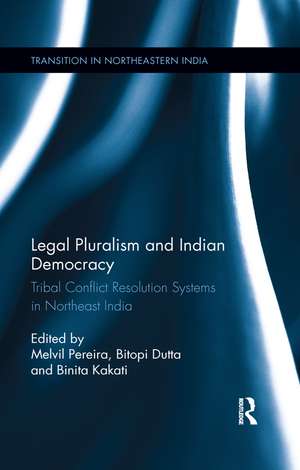Legal Pluralism and Indian Democracy: Tribal Conflict Resolution Systems in Northeast India: Transition in Northeastern India
Editat de Melvil Pereira, Bitopi Dutta, Binita Kakatien Limba Engleză Paperback – 28 mar 2019
- charts the transition of traditions from colonial rule to present day, through constitutionalism and the consolidation of autonomous identities, as well as outlines contemporary debates in an increasingly modernising region;
- explores the theoretical context of legal pluralism and its implications, compares the personal legal systems with that of the mainland, and discusses customary law’s continuing popularity (both pragmatic and ideological) and common law;
- brings together case studies from across the eight states and focuses on the way individual systems and procedures manifest among various tribes and communities in the voices of tribal and non-tribal scholars; and
- highlights the resilience and relevance of alternative systems of redressal, including conflict resolution and women’s rights.
| Toate formatele și edițiile | Preț | Express |
|---|---|---|
| Paperback (1) | 416.22 lei 6-8 săpt. | |
| Taylor & Francis – 28 mar 2019 | 416.22 lei 6-8 săpt. | |
| Hardback (1) | 1000.27 lei 6-8 săpt. | |
| Taylor & Francis – 27 iul 2017 | 1000.27 lei 6-8 săpt. |
Preț: 416.22 lei
Nou
Puncte Express: 624
Preț estimativ în valută:
79.65€ • 83.05$ • 66.20£
79.65€ • 83.05$ • 66.20£
Carte tipărită la comandă
Livrare economică 20 martie-03 aprilie
Preluare comenzi: 021 569.72.76
Specificații
ISBN-13: 9780367277802
ISBN-10: 0367277808
Pagini: 338
Dimensiuni: 138 x 216 x 19 mm
Greutate: 0.45 kg
Ediția:1
Editura: Taylor & Francis
Colecția Routledge
Seria Transition in Northeastern India
Locul publicării:Oxford, United Kingdom
ISBN-10: 0367277808
Pagini: 338
Dimensiuni: 138 x 216 x 19 mm
Greutate: 0.45 kg
Ediția:1
Editura: Taylor & Francis
Colecția Routledge
Seria Transition in Northeastern India
Locul publicării:Oxford, United Kingdom
Public țintă
PostgraduateCuprins
List of Illustrations. List of Contributors. Acknowledgments. List of Abbreviations. Introduction Part I Conflict Resolution Systems: Theories, Thoughts and Concepts 1. Conflict Resolution Systems in the Tribal Societies of Northeast India: Legal Pluralism and Indian Democracy 2. Diverse Personal Laws, Gender Justice and Controversy over the Uniform Civil Code 3. Customary Law, State Law and Non-State Organisation: The Predicaments of Legal Pluralism and Growing Conflict in Nagaland 4. Customary Law and the Politics of Peace and Conflict Resolution in Post-Colonial States: Threats Posed by Modernisation and Development 5. Legal Pluralism and Alternative Dispute Redressal Systems in the Northeast 6. The Resilience of Tribal Conflict Resolution Systems in Northeast India: A Panoramic View 7. Mizo Customary Laws and the Discourse of Women’s Rights Part II Fights in the Field: Case Studies of Resolution Systems from the Communities of Northeast India 8. Traditional Methods of Conflict Resolution of the Sumi Naga Tribe 9. The Hall Without Walls – The Role of Namghars in Peace-building: Practices and Prospects 10. The Khasi-Pnar Ideology of Peace and Conflict Resolution 11. Indigenous Methods of Conflict Resolution in Sikkim: A Case Study on the Dzumsa 12. Exploring Traditional Approaches to Resolving Conflicts over Land Resources: The Case of the Nyishi Tribe in Arunachal Pradesh 13. Hmar Traditional Practices in Conflict Resolution: An Anthropological Perspective 14. Conflicts and Systems for its Resolution among the Paites of Manipur 15. Forums for Conflict Resolution in the Jaintia Tribal Community over Land Resources 16. Indigenous Conflict Resolution Mechanisms: A Study on the Riang of Tripura. Epilogue. Glossary. Index
Notă biografică
Melvil Pereira is Director of North Eastern Social Research Centre (NESRC), Guwahati, Assam, India, and a member of the Assam Backward Class Commission.
Bitopi Dutta is currently a doctoral candidate at Dublin City University, Ireland.
Binita Kakati is Research Associate at North Eastern Social Research Centre (NESRC), Guwahati, Assam, India.
Bitopi Dutta is currently a doctoral candidate at Dublin City University, Ireland.
Binita Kakati is Research Associate at North Eastern Social Research Centre (NESRC), Guwahati, Assam, India.
Descriere
This book offers a multifaceted look at Northeast India, and the customs and traditions that underpin its legal framework. The book charts the transition of traditions from colonial rule to present day, and explores the theoretical context of legal pluralism and its implications.













